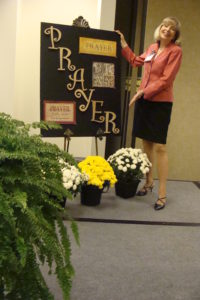Fear of Public Speaking Prayer

Prayer is crucial in overcoming the fear of public speaking because prayer helps you overcome fear. Because the fear of public speaking is irrational, it cannot be totally overcome by simply using your mind to get over it, or being well rehearsed or being extremely prepared. Experts tell us that the fear of public speaking is the number one fear today – in fact, the fear of dying is number 2! Fear of this magnitude needs a strong prayer strategy that depends on power beyond ourselves.
In this article you’ll learn prayer strategies to overcome the fear of public speaking during preparation for your talk. Plus you’ll find a short prayer for peace and empowerment to use right before you go in front of an audience to speak.
I have personally struggled with the fear of public speaking and I’m living proof that with God’s help you can become comfortable speaking to an audience – and even look forward to it. At the end of this article I’ll share my ups and downs to help encourage you.
1. Meditate on the truth that God created your ability to speak and has given you something to say.
 God created us as social beings who need each other. Being able to express ourselves effectively to others is one of the graces meant to help us learn from each other, understand each other, grow to love and appreciate each other and to be able to work together for the common good. The gift of speech has divine importance because it is the primary means through which faith is shared, learned and spread.
God created us as social beings who need each other. Being able to express ourselves effectively to others is one of the graces meant to help us learn from each other, understand each other, grow to love and appreciate each other and to be able to work together for the common good. The gift of speech has divine importance because it is the primary means through which faith is shared, learned and spread.
The Bible says, “And how can they believe in him if they have never heard about him? And how can they hear about him unless someone tells them?” (Romans 10:14 NIV)
Begin by affirming in prayer that God has fully equipped you to speak to others and can empower you to do so effectively.
2. Pray about God’s purpose when you speak.
Maybe you have to give a presentation in class or at work. Maybe there’s a special occasion coming up and you’ll be expected to make a toast or say a few words of welcome. Maybe you’ve been asked to lead a volunteer group or teach something. Whatever the topic of your speech, ask God to give you a specific purpose that goes beyond how well you get through delivering the talk. Purposes might include:
giving information
helping people get on board as a team
giving a personal testimony or sharing your experiences
showing your care and concern for others or a cause
learning to trust God
getting practice in speaking publicly
making new contacts
receiving new ideas from comments and questions, etc.
The more you focus on what you or your audience might receive from your talk, the less focused you are on “performance” and how well you’re speaking.
Also, ask God to help you believe that there are things that you can say that make a difference in the world. I started out as a quiet person who let others do all of the talking. I started warming up to public speaking when I began wishing that I could share some of my thoughts and ideas with others. At first I tried to share my thoughts through writing, but in the days before the Internet it was nearly impossible to get published and get your ideas out there. The only way to do it was via speaking. So I began to try. I made mistakes along the way, but I kept trying until I achieved an adequate level of confidence and competence. Having a message motivated me to do public speaking.
3. Talk honestly with God about your perceived inadequacy at public speaking.
 Did you know that Moses turned God down because Moses couldn’t speak well? Yet Moses went down in history as a skilled leader who persuaded Pharaoh to free the Hebrew nation and who led Israel for forty years. Here’s what it says in the Bible when God called Moses to speak:
Did you know that Moses turned God down because Moses couldn’t speak well? Yet Moses went down in history as a skilled leader who persuaded Pharaoh to free the Hebrew nation and who led Israel for forty years. Here’s what it says in the Bible when God called Moses to speak:
“Moses said to the Lord, ‘O Lord, I have never been eloquent, neither in the past nor since you have spoken to your servant. I am slow of speech and tongue.’ The Lord said to him, ‘Who gave man his mouth? Who makes him deaf or mute? Who gives him sight or makes him bind? Is it not I, the Lord? Now go; I will help you speak and will teach you what to say.’” (Exodus 4:10-12 NIV)
Why did God choose Moses? It wasn’t based on his speaking ability. It was based on something much more important that was a far greater gift. Moses knew how to listen to God and understood exactly what God was saying! God and Moses were on the same wavelength. The world needed what Moses alone had to say.
You, too, have a skills and perceptions to share. Maybe you have a fresh perspective, or a personal experience, or technical knowledge, or an ability to see similarities and connections between things or an insight into human interactions, or an ability to remember facts and figures, or the ability to persuade people to follow a good course of action or maybe you have great compassion.
Ask God to help override your objections by claiming this amazing promise as your own:
“Go. I will help you speak and will teach you what to say.” (Exodus 4:12)
4. Ask God to send you a partner who can help boost your confidence when speaking.
 Even after receiving a strong promise from God, Moses still had reservations. Here’s how the conversation continued:
Even after receiving a strong promise from God, Moses still had reservations. Here’s how the conversation continued:
“Moses said, ‘O Lord, please send someone else to do it.’ Then the Lord’s anger burned against Moses and he said, ‘What about your brother, Aaron the Levite? I know he can speak well. He is already on his way to meet you, and his heart will be glad when he sees you. You shall speak to him and put words in his mouth; I will help both of you speak, and will teach you what to do.’” (Exodus 4:13-15 NIV)
Ask God if there’s someone who might partner with you when you’re called on to speak. Possibilities might include doing a joint presentation, having your partner help you write your talk, having your partner listen to your speech beforehand to offer suggestions, having your partner answer questions after the speech that are outside of your expertise, etc.
It also helps to enlist a friend to be in the audience as a good listener during your talk. I discovered that one of my friends gives amazing non-verbal feedback to speakers. She sits forward in her chair, smiles, nods and makes direct eye contact as if she’s hanging on your every word. It always makes me feel at ease to look at her and feel that I’m connecting with someone. If you can’t bring a good listener with you for moral support, look for someone in the crowd who gives good nonverbal feedback and focus on them when you need a confidence boost.
5. Enlist others to pray for you before and during your speech.
I have to admit that I hate to bother people by requesting prayer for something that I feel like I should be able to do without help. However we have already established that God has created us to speak and God has given us a purpose, so it follows that we should also ask for prayer support when we are speaking.
Many religious groups have prayer support set up for those speaking. One organization I spoke for held a prayer meeting a week before their outreach meeting and prayed specifically for me as the speaker. Another group stationed someone in a private prayer room during my talk to support me through prayer.
 If you’re speaking to a secular group you can enlist a prayer partner or friend to pray for you during your speech. For instance, recently a friend in another state asked if I would pray for her when she gave remarks at her retirement party. You can also email a friend your request with the specific day and time or send a prayer request through a prayer chain or post a request on a prayer board online.
If you’re speaking to a secular group you can enlist a prayer partner or friend to pray for you during your speech. For instance, recently a friend in another state asked if I would pray for her when she gave remarks at her retirement party. You can also email a friend your request with the specific day and time or send a prayer request through a prayer chain or post a request on a prayer board online.
6. Ask God to show you the best ways to prepare to speak.
Another huge benefit of prayer is that we can ask God to guide us. Most of us don’t hear definite directions like Moses did. Instead I have experienced God’s guidance through answering thoughts or a train of thoughts that feel like they are flowing well.
There are many other articles written on how to write speeches and how to prepare to speak. The purpose of this article is to help you feel comfortable asking for God’s guidance as to what will work best for you and then going ahead and doing it with confidence. The more small things you can do in preparation to make things easier, like printing out the outline in large print, the less things there will be to worry about when you’re speaking.
7. Claim God’s promises before and during your speech.
Here are some strong promises from God to claim:
“There is a time for everything, and a season for every activity under heaven …a time to be silent and a time to speak…” (Ecclesiastes 3:1,7 NIV)
Each one should use whatever gift he has received to serve others, faithfully administering God‘s grace in its various forms. If anyone speaks, he should do it as one speaking the very words of God. “ (I Peter 4:14 NIV)
“May the words of my mouth and the meditation of my heart be pleasing in your sight, O Lord, my Rock and my Redeemer.” (Psalm 19:14 NIV)
… “He even makes the deaf hear and the mute speak.” … (Mark 7:37 NIV)
“I can do all things through Christ who strengthens me.” (Philippians 4:13 NIV)
8. Rely on God when you feel fearful.
Anxiety can cause actual physical symptoms, including a pounding heart, sweating and nausea. Experts tell us that the more you try to fight these physical symptoms, the worse they become. They advise us to push through and use the adrenaline surge to give energy to our presentations. Anxiety calming prayer can help.
Other ways to calm yourself before a talk include mentally singing a song or repeating a Bible verse such as one of the following:
“So do not fear, for I am with you; do not be dismayed, for I am your God. I will strengthen you and help you; I will uphold you with my righteous right hand.” (Isaiah 41:10 NIV)
“The Lord is my light and my salvation— whom shall I fear? The Lord is the stronghold of my life— of whom shall I be afraid?” (Psalm 27:1 NIV)
“I sought the Lord, and he answered me; he delivered me from all my fears.” (Psalm 34:4 NIV)
“For God did not give us a spirit of timidity, but a spirit of power, of love and of self-discipline.” (2 Timothy 1:7 NIV)
9. Ask God to direct you to outside help if you need it.
If you are unable to move forward in conquering your fear of public speaking, ask God to direct you to one of the many sources of help available to you. Counselors and therapists can teach behavioral techniques to help calm your anxiety. In some case, medication can be used when needed. You can also take a class on public speaking or join a group such as Toastmasters that provides opportunities to speak in front of encouraging audiences.
Prayer before speaking
Here is a short prayer to use before speaking:
Dear God,
I affirm that you created me with the ability to speak to others so they might learn and be encouraged. Please grant me the supernatural ability to speak. Give me your peace and a sense of calm. Keep me focused. Keep my mind clear. I depend totally on you today. “May the words of my mouth and the meditation of my heart be pleasing in your sight, O Lord, my Rock and my Redeemer.” (Psalm 19:14 NIV) Amen
My Personal Experiences Overcoming the Fear of Public Speaking
Getting God’s perspective on my worst memory of public speaking.
To overcome my fear of public speaking, it has helped me to go back and figure out what made me afraid of public speaking. In school there were times when I was fearful, tongue tied and felt embarrassed. One vivid memory of a terrible experience I had in public speaking happened during my first semester in college when I was assigned to give a pledge of office to a new vice president of an organization. I wasn’t allowed to read it out of a book and I was supposed to give it exactly as written, word for word. I didn’t have time to memorize it. I stood there like a deer in headlights. A prompter had to feed me every word to repeat.
It’s good to go back and ask God about specific incidents that made you lose your confidence. Then ask for God’s perspective on it. When I thought about this terrible memory, the thought came to me that all these years later, probably not a single person who was in the room that night remembers anything at all about my dismal performance. And if for some strange reason they remembered it at all, they probably remember feeling sorry for me because they knew how it feels to be up there speaking.
As I mentioned at the beginning of this article, the fear of public speaking is the number one fear. That tells us that whenever you’re speaking in front of an audience, you’re in front of people who are rooting for you and who actually admire you for speaking and wish they could be so brave. Prayer helped me gain perspective on my past failures so they wouldn’t hold me back from expressing myself in front of groups going forward.
Starting by teaching children first.
 When my children were young, I began to be asked to volunteer to help with vacation Bible school and to teach Sunday school. At the time it didn’t seem like a significant step. However, looking back I see that a good way to get comfortable speaking to groups is to start with children. Children automatically think that because we’re adults, we know what we’re talking about and they accept us as we are.
When my children were young, I began to be asked to volunteer to help with vacation Bible school and to teach Sunday school. At the time it didn’t seem like a significant step. However, looking back I see that a good way to get comfortable speaking to groups is to start with children. Children automatically think that because we’re adults, we know what we’re talking about and they accept us as we are.
Learning how to speak.
After my first book was published I found that the only way to sell books is to speak to groups. So I reluctantly took speaker training for a Christian organization that had groups in towns all over the state who needed a new speaker each month. It turned out to be really helpful to me as I learned to do public speaking to be able to give the exact same personal testimony speech over and over again to different audiences.
The group held a speaker training seminar, which was also extremely helpful. They gave us all sorts of practical advice, such as keeping our speech in a ring binder. Loose papers can be dropped and get mixed up and fluster us. After speaking for several months, I practically had the speech memorized, but I always kept the ring binder open to the right page while speaking – just in case.
Learning how to prepare.
Before speaking, I rehearsed by standing in front of the bathroom mirror and going through my whole speech a number of times. Seeing my own face in the mirror helped me get used to the fact that when I was giving the speech, I would be seeing people’s faces. I bought a red suit with a navy lapel that I had altered to fit me comfortably and I wore it every time I spoke so I wouldn’t have to worry what to wear or how I looked.
Calming my racing heart before speaking.
At the meetings, there was always a soloist right before I spoke. Because I knew my time to get up at the podium was so close, my heart always started pounding during the song. I found it extremely helpful to become laser focused on the soloist and the words of the song, which allowed me to take the focus off myself and put send up a quick prayer to God for help. I also made it a point to make my facial expression look like I was really enjoying the song. Smiling helps!
Connecting personally with audience members.
I noticed that when other guest speakers came to my local club, they “hid out” alone before the meeting started. I imagine that this was a time when they were making sure they were prepared and fighting their nerves. I decided to try the opposite approach. When I was speaking I began arriving early and stood near the door. I tried to greet each audience member as they arrived by saying, “Hi, I’m Karen Barber and I’m speaking today.” Then I complimented each lady on something personal, such as a piece of jewelry or a lovely accent. Then I shook her hand.
I found that greeting everyone as they arrived had benefits for me and for my audience members. It helped occupy me during that nerve wracking time before the meeting started. It also helped me feel that people were glad to meet me and they were new friends, not critics. I like to think it helped the audience members relate to me more personally as well. Women often commented, “It’s so nice to meet you. Most of our speakers don’t greet us when we arrive.” And finally, it fit the overall purpose of my speech, since the purpose was to tell others how to accept Jesus as their personal savior. I felt like a touch or a handshake before my speech would give us more of a personal connection and help open the hearts of those who were ready to hear this wonderful good news.
Making friends with the microphone.
Because I’m not a very loud spoken person and I’m terrible with gadgets, I had to learn to make friends with the microphone. I found that it’s OK to lean forward at the podium and speak into the microphone on a stand. In fact, leaning forward is a nonverbal cue that you really have something you really want to tell others. I also found that appropriate hand gestures are helpful in working off nervous energy during speeches. So I developed gestures that went along with my talk at home in front of the mirror when I practiced my speech.
A disappointing speech leads to a breakthrough.
Being on the speaking circuit for the Christian organization helped me make great strides in overcoming my fear of public speaking. However my biggest breakthrough came a few years later when I was asked to speak at a half-day seminar in a church in another city. I was extremely honored that I’d been asked to lead a seminar on prayer. And they offered me a very generous speaking fee for doing it! I’m afraid my pride got a little out of control thinking this was my big break and imagining adoring audience members afterwards spreading the word about how good a speaker I was. I worked feverishly on the ideas that I had developed on how to find an answer to every prayer, unaware that several things I was doing were conspiring against me.
 I’m a writer so I went at it like I was writing my second book, doing page after page for the seminar exactly like I wanted to say it. I really liked every word I’d written and I didn’t want to leave anything out. On the other hand, I knew I couldn’t possibly memorize several hours worth of teaching. So I decided I would read it all – word for word. I now know that this was a very big mistake because an audience gets tired of someone reading things to them very quickly. Public speaking experts advise that you work from a good outline so you won’t be tempted to read your speech. Because I was so focused on getting every word right, I wasn’t able to pick up on the nonverbal cues my audience was giving me that it was time to make things a little more interesting and interactive. And because I was reading, I started going really fast when I saw that time was running out.
I’m a writer so I went at it like I was writing my second book, doing page after page for the seminar exactly like I wanted to say it. I really liked every word I’d written and I didn’t want to leave anything out. On the other hand, I knew I couldn’t possibly memorize several hours worth of teaching. So I decided I would read it all – word for word. I now know that this was a very big mistake because an audience gets tired of someone reading things to them very quickly. Public speaking experts advise that you work from a good outline so you won’t be tempted to read your speech. Because I was so focused on getting every word right, I wasn’t able to pick up on the nonverbal cues my audience was giving me that it was time to make things a little more interesting and interactive. And because I was reading, I started going really fast when I saw that time was running out.
The second thing that worked against me was the generous speaking fee. The Christian groups that I had previously spoken for only gave a small amount that barely covered my gas money. Being given a generous amount made me feel important. It also made me want to deliver their money‘s worth at the seminar. So I squeezed in way too much material, more than the audience could take in at once.
Looking back, I’m hoping that I didn’t do as poorly as I felt I did when I finished up that day. Several people did come up to me afterwards to tell me that they had learned something at the seminar. But it was something that I overheard as I prepared to leave that made me question my worth as a speaker. I heard one of the organizers of the seminar say to another that the attendance had been much lower than expected and that they didn’t have enough money to cover expenses. I felt embarrassed, so much so that I gave them back half of my speaking fee. They said I was being generous and kind. I secretly felt like I hadn’t earned the money.
As I was driving home a strange thing happened. Instead of vowing never to speak to a group again I found myself begging God to give me another chance to speak. I asked God to give me a heart for reaching my audience. I didn’t want it to be about me ever again – how much I knew, how entertaining I was, how much I was being paid, how well I spoke, how much content I could squeeze in, whether or not I sold any books or got good word of mouth publicity. Instead I wanted to make a difference in someone’s life and their relationship with God because they heard me speak. I wanted people to “get it” about prayer.
This change of attitude made all of the difference in the world in overcoming my fear of public speaking. It wasn’t all about me anymore. It was all about my audience.
And yes, I did stop writing speeches that I planned to read word for word. Now I write out what I want to say and I read it over several times out loud in front of the bathroom mirror. I then turn it into an outline, keeping a pen nearby to jot down a word or two that will remind me of something else I want to say under each point. Then I print out my outline for my final speech. I do it in a large font so I won’t have to fumble with reading glasses when I‘m speaking. Reading glasses make it hard to keep eye contact with the audience plus they really emphasize it when you look down at your notes.
A good place to end my story with the overall lesson that I have learned is with the following verse from the Bible:
“If I speak in the tongues of men and of angels, but have not love, I am only a resounding gong or a clanging cymbal.” (I Corinthians 13 :1, NIV)
The success of public speaking has little to do with how well we speak. Instead, it’s all about how much we care about our audience and feel that we have something to say that will help them.
Other Related Articles
Anxiety Calming Prayer
Social Anxiety Prayer for God’s Help
Insomnia Prayer
How to Pray Scriptures
Copyright Karen Barber 2016. All rights reserved.
